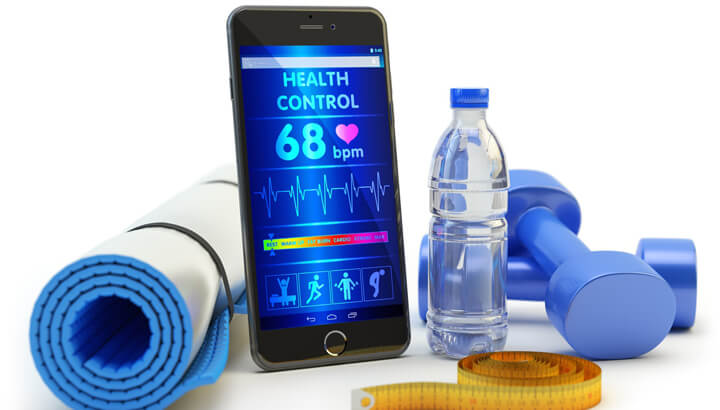
Fitness trackers seem to be all the rage these days. From FitBits to pedometers, to the seemingly endless choice of apps available for mobile devices, there’s certainly no shortage when it comes to methods of keeping track of your fitness metrics. But are fitness trackers a good option for you? Some people love them, but others just don’t get what all the fuss is about. But we’re here to help. Here are some of the most significant benefits and potential downfalls to using fitness trackers.
Pros
You can see your progress

For many of us, especially those of us who may be starting a new workout routine, the visible evidence of our progress can encourage us to keep going. When you’re keeping track of the number of miles you walk or jog each day, for example, and you see it steadily increasing, it can be a very helpful motivator. Seeing the numbers right there in front of you is undeniable proof of your progress, and can help you keep going on those days when it would be easier just to hit the snooze button and go back to sleep.
Personal goals
Whatever your unique exercise goals, there are trackers that can support you. If you’re trying to speed up your mile time, or increase your weekly mileage, you can choose the intervals that are right for you, and use your tracker to help you get there. For example, if you’re training for a half-marathon, but you usually run 5ks, you can use your fitness tracker of choice to track your mileage and help you as you increase from 5ks to 10ks, and 10ks to the full half-marathon distance. Whatever steps would help you the most in achieving your goals, you can use your fitness tracker to help you get there.
Solo workouts

Some people thrive in the gym, and there are certainly a lot of benefits to taking classes and working out with others. But some of us prefer to workout alone. And with certain kinds of workouts — like biking or running — it’s often necessary, at least part of the time. Fitness trackers allow you to monitor some of the same metrics as the machines at the gym, without having to go there. Treadmills, for example, will keep track of your pace, mileage and the approximate number of calories you’ve burned. But with fitness trackers, you can do the same wherever you are.
As much interaction as you want
For those who prefer solo workouts but enjoy sharing their progress with friends and family, trackers are a great choice, as many of them have social media options. Pulling together a group of friends and sharing your workout results on a regular basis can give you the support system you need to keep going. And fitness trackers give you the chance to get that kind of positive feedback without having to coordinate schedules, which can be difficult, since it seems like we’re all pretty busy these days. What’s more, working out in groups can be intimidating if you’re just starting out, but fitness trackers allow you to connect with others about your fitness goals without having to face the pressure of keeping up with other people before you may be ready.
Cons
Getting fixated

While tracking your progress can be useful, and can help you feel motivated to keep going and achieve subsequent goals, it has some potential downfalls, as well. It’s easy to look at the numbers and get down on yourself if your pace is a little slower today than yesterday, or your walk a little shorter. If we become fixated on constantly outdoing ourselves, then the metrics can become a tool we use to judge ourselves. Yes, it’s good to generally continue progressing in a positive direction. But an off day here or there is nothing to worry about. In fact, we all need to take it easy from time to time. Pushing ourselves to the limit day after day will likely result in injury or burnout.
It can sap the joy out of working out
One of the most important factors that will determine whether you’re able to maintain your workout routine over the long term is how much you enjoy it. Finding a form of exercise that you genuinely enjoy is crucial. But when it becomes all about the numbers, that can sap a lot of the fun and joy right out of the workout. Going for a jog, for example, can really be a lot of fun. If you put on your headphones, create a great playlist, and really allow yourself to pay attention to how strong and alive your body feels while you’re running, it can be a pretty uplifting experience. But if, as a result of tracking the metrics of your jog, you become more fixated on shaving another five seconds off your mile time than on really enjoying your workout, you’re just sabotaging yourself. You’re less likely to stick with an exercise routine when it feels like work.
The expense
There are, of course, apps that are free or inexpensive. But some of the wearable tech can be pretty pricey. And if you end up not liking it, that’s a lot of money to shell out on a device that’s just going to end up sitting in a drawer. So if you’re thinking about purchasing a wearable fitness tracker but you’re not sure if it’s right for you, it’s probably a good idea to try out one of the free or cheap apps first, to get a sense of what it’s like to keep track of the metrics.
Comparing ourselves

As mentioned above, the social media sharing options that a lot of trackers offer have a lot of benefits. They can connect you with friends and family who are likely to support and encourage you. But the flip side of the coin is that, social media sharing can turn into just another way that we compare ourselves to others. If you see that your friend’s weekly jogging mileage is significantly higher than yours, for example, it’s easy to feel inadequate. And those kinds of negative feelings can be so discouraging that they cause us to stop working out altogether.
In short, as with most things in life, there are benefits and downfalls to fitness trackers. If you use them in a healthy way, and you’re approaching your metrics with self-love and positivity, you’ll likely benefit. But it can be all too easy for our self-judging minds to slip over to the dark side of fitness tracking, and that’s something you’ll want to be aware of.
— Sarah Cooke

